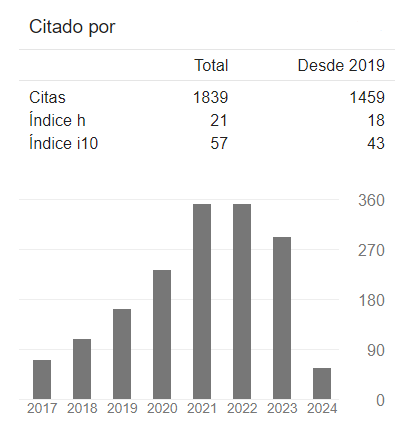Reading Poulantzas from Latin America: validity, contemporary issues and contributions to a theory of the State
DOI:
https://doi.org/10.24142/raju.v16n33a14Keywords:
Latin America, state theory, Nicos Poulantzas, development, dependency, neoliberal globalization, MarxismAbstract
One of the predominant characteristics in the work of Nicos Poulantzas is his marked subjectivity, which was traversed by the historical moment in which his life passed, since it was a time when revolutionary processes lost validity and remained bitter, but at the same time time, very important lessons; where despite constant instability, capitalism managed to restore and transform itself at the expense of the state. This writing explores the theoretical validity of the intellectual work of Poulantzas, its originality distinguished by belonging to a heterodox Marxism more concerned with the question of the State; at the same time, elements of analysis such as dependency, development and the neoliberal global management of capital are explicitly included today. This from the reading of his work from and with a Latin American perspective that allows to conclude with some theoretical elements for the construction and updating of a theory of the State that takes into account the particularities of this part of the world.
References
Cardoso, F.H. y Faletto, E. (1977). Dependencia y desarrollo en América Latina. Siglo XXI.
Comisión Económica para América Latina - CEPAL. (1951). Estudio económico de América Latina 1949. Organización de Naciones Unidas, Departamento de Asuntos Económicos, Secretaría General.
García Linera, Á. (2015). Una lectura a partir de Poulantzas: Estado, democracia y socialismo [conferencia]. Coloquio Internacional dedicado a la obra de Nicos Poulantzas: un marxismo para el siglo XXI. Universidad de la Sorbona, París, Francia.
Gorriti, J. (2018). Estado, clases sociales y democracia: Un estudio crítico del pensamiento de Nicos Poulantzas. Estudios Sociológicos.
Gramsci, A. (2019). Antología. Barcelona, España: Siglo XXI y Anthropos.
Hall, S. (1980). Nicos Poulantzas: state, power socialism. New Left Review, 119. Recuperado de https://newleftreview.org/issues/i122
Jessop, B. (1985). Nicos Poulantzas. Marxist theory and political strategy. Macmillan Publishers.
Kicillof, A. (2005). Genesis y estructura de la teoría general de Lord Keynes. Universidad de Buenos Aires, Facultad de Ciencias Económicas, Departamento de Doctorado.
Luxemburgo, R. (2017). La revolución rusa. El Perro y la Rana y Terramar.
O’Donnell, G. (1984). Apuntes para una teoría del Estado. En O. Oszlak. (Comp.): Teoría de la burocracia estatal: apuntes críticos (pp. 199-250). Paidós.
Oszlak, O. (1978). Formación histórica del Estado en América Latina: elementos teórico-metodológicos para su estudio. Estudios CEDES, 1 (3). https://filadd.com/doc/2-oszlak-formacion-historica-del-estado-en-america
Poulantzas, N. (1967). Marxist Political Theory in Britain. New Left Review, (43). https://newleftreview.org/issues/i43/articles/nicos-poulantzas-marxist-political-theory-in-britain
Poulantzas, N. (1978). Para un análisis marxista del Estado. Pre-textos.
Poulantzas, N. (2007). Poder político y clases sociales en el Estado capitalista. Ciudad de México. Siglo XXI.
Poulantzas, N. (2014). Estado, poder y socialismo. Siglo XXI.
Thwaites, M. (Comp.). (2007). Estado y marxismo: un siglo y medio de debates. Prometeo.
Thwaites, M. y Castillejo, J. (2008). Desarrollo, dependencia y Es-tado en el debate latinoamericano. Araucaria. Revista Iberoamericana de Filosofía, Política y Humanidades, 10(19), 24-45. https://www.redalyc.org/articulo.oa?id=28201902
Thwaites M. (2008). The Poulantzas contribution to think Latin America. Presentation, University of Salford.
Thwaites, M. (2010). Después de la globalización neoliberal: ¿Qué Estado en América latina? OSAL CLACSO, (27), 19-43. http://biblioteca.clacso.edu.ar/gsdl/collect/clacso/index/assoc/D9409.dir/05Thwaites.pdf
Published
How to Cite
Issue
Section
License
Copyright (c) 2021 Emanuel Cardona Marín

This work is licensed under a Creative Commons Attribution-NonCommercial-ShareAlike 4.0 International License.
La rivista consente all'autore (s) di mantenere i diritti di pubblicazione senza restrizioni.
Le journal permet à l'auteur (s) de conserver les droits de publication sans restrictions.
The journal allows the author (s) to retain publication rights without restrictions.
La revista le permite al autor(es) retener los derechos de publicación sin restricciones
Die Zeitschrift ermöglicht es dem / den Autor (en), Veröffentlichungsrechte ohne Einschränkungen zu behalten.
A revista permite que os autores mantenham os direitos de publicação sem restrições.











































